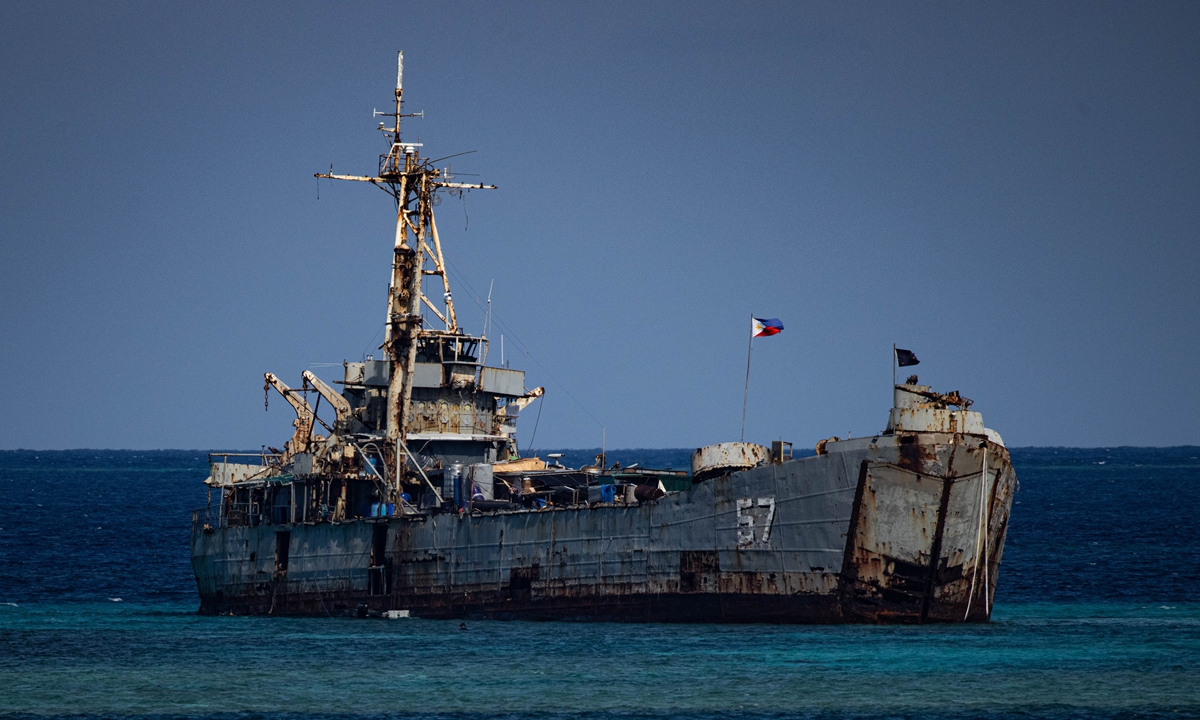
Photo: China Coast Guard
Who is confusing right and wrong and turning black into white on the ecological issues of the South China Sea? A report from the Chinese side effectively disclosed the reality of Ren'ai Jiao with professional and detailed statistics. From the Survey Report on the Damage to Coral Reef Ecosystem by Illegally Grounded Military Vessel at Ren'ai Jiao jointly released by relevant Chinese departments on July 8, it is seen that this military vessel has not only brought about bilateral friction, but has also caused shocking serious marine pollution. Over the past 25 years, this illegal "grounded" warship has been like a rusty nail, which has not only disrupted the peaceful and friendly atmosphere in the region, but also penetrated into the already fragile ecosystem of the South China Sea, constantly threatening future sustainable development.
Coral reefs are known as the "tropical rainforests of the ocean" and play a key role in maintaining marine biodiversity. The Nansha Qundao (Nansha Islands) are located in the radiation belt of the global "Coral Triangle," where the coral reef ecosystem is the most important and distinctive ecosystem. Unfortunately, the aggregate coverage of reef-building corals at Ren'ai Jiao reef platform declined approximately 38.2 percent from 2011 to 2024, and the community structure of benthic invertebrates at Ren'ai Jiao was imbalanced, especially in the area around the illegally grounded military vessel. In addition, the concentrations of heavy metals, oils, and dissolved inorganic phosphorus are also significantly higher than historical records. Many of these consequences are irreversible.
A large amount of irrefutable evidence shows that this rusty warship has become a significant public hazard in the South China Sea. How to deal with it is not controversial today as the international community regards environmental protection as a key issue. Moreover, the origins and rights and wrongs surrounding this warship are quite clear, and China has explained this to the international community on multiple occasions. From any perspective, this vessel should not be present in the South China Sea, as it represents indeed a form of marine, political, and ecological garbage.
Faced with a large amount of data from the Chinese side, photos and videos taken on site, the Philippines issued a brief statement on July 9 after remaining silent for nearly two days, accusing Chinese experts of sowing disinformation and conducting malign influence. However, the statement did not provide evidence to prove that China's accusations are false, ending hastily with a few sentences. It is not difficult to see that Manila now has a guilty conscience. The latest released video shows that the Chinese side was disturbed by the Philippines when investigating the ecosystem of Ren'ai Jiao. If the Philippines has nothing to hide, why go to such lengths?
In the issue of Ren'ai Jiao, the Philippines is in the wrong in all directions, and Manila is well aware of this. Over the years, in order to boost morale and cheer itself up, the Philippines has portrayed itself as a "weak victim" in the South China Sea issue, staging many performances, such as filing for arbitration, organizing military exercises, and threatening to sue China for environmental damage. These performances, like the illegal "grounded" warship, will only serve as evidence of the Philippines dumping marine and political garbage into the South China Sea. As their harmful actions in the region are gradually exposed, the pressure faced by the Philippines will only increase, ultimately leading to more harm than good.
The reasons for the current situation in the Ren'ai Jiao are very clear. Firstly, the Philippines has violated its commitment by refusing to remove the illegally grounded warship at Ren'ai Jiao. Secondly, it has denied the "gentleman's agreement" reached with China during the Duterte administration, and has been provocatively encroaching on the sea. Thirdly, it has disregarded the internal understanding reached with China under the current Philippine government on the Ren'ai Jiao issue by persisting in transporting construction materials to the illegally grounded warship at Ren'ai Jiao, attempting to carry out large-scale repairs and reinforcements in order to permanently occupy the reef. However, no matter how Manila tries to manipulate the situation, whether through bullying or sweet talk, it cannot change the fact that its actions are completely unjustified. In particular, the Philippines has overestimated the true willingness of the US and a few allies to support it, underestimated China's determination and will to defend its sovereignty and maritime rights, and misjudged the attitudes of neighboring countries, including ASEAN.
Recently, China and the Philippines held the ninth meeting of the Bilateral Consultation Mechanism on the South China Sea. Both sides exchanged views candidly and constructively on the situation in the South China Sea, especially on the management of Ren'ai Jiao, and reached cooperation in some low-sensitive areas. It can be seen that China has shown goodwill and sincerity in resolving issues through dialogue and consultation, and relevant Philippine authorities have expressed a desire to ease situations. This is a relatively positive trend, but to maintain it, the Philippine side needs to eliminate external interference and restrain internal political impulses from complicating and escalating the South China Sea issue. China seeks to resolve issues through dialogue to the greatest extent possible, but this does not mean it will tolerate unruly behavior indefinitely, nor will it accept political blackmail from Manila.



